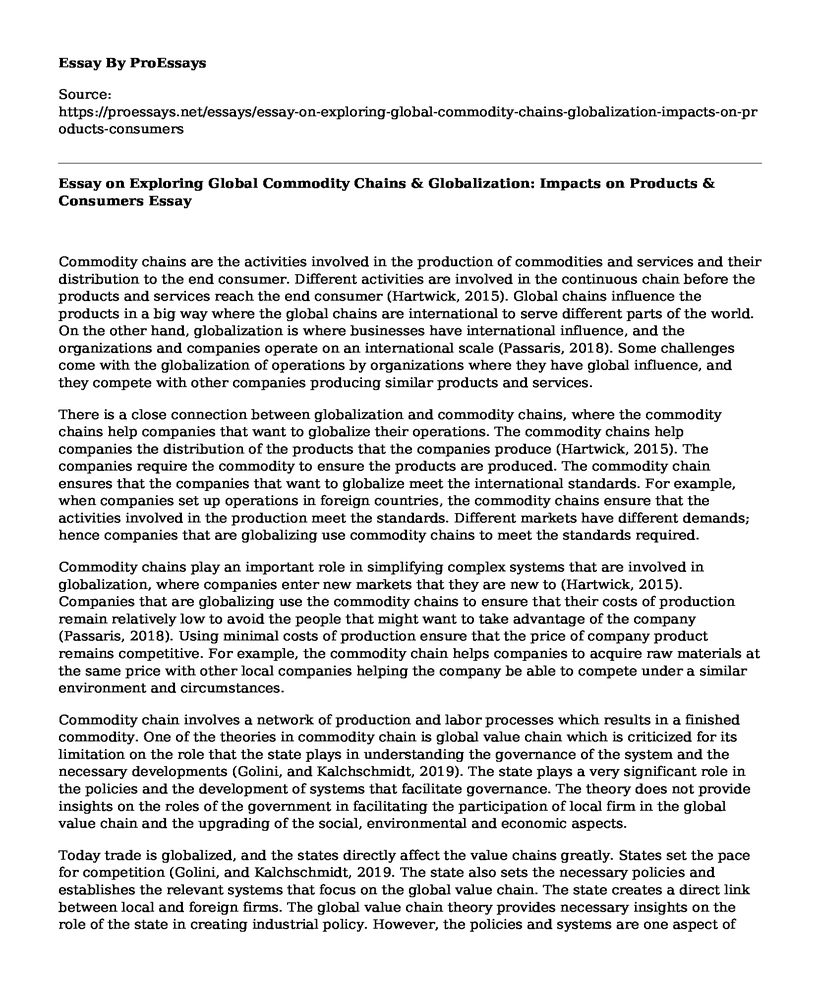Commodity chains are the activities involved in the production of commodities and services and their distribution to the end consumer. Different activities are involved in the continuous chain before the products and services reach the end consumer (Hartwick, 2015). Global chains influence the products in a big way where the global chains are international to serve different parts of the world. On the other hand, globalization is where businesses have international influence, and the organizations and companies operate on an international scale (Passaris, 2018). Some challenges come with the globalization of operations by organizations where they have global influence, and they compete with other companies producing similar products and services.
There is a close connection between globalization and commodity chains, where the commodity chains help companies that want to globalize their operations. The commodity chains help companies the distribution of the products that the companies produce (Hartwick, 2015). The companies require the commodity to ensure the products are produced. The commodity chain ensures that the companies that want to globalize meet the international standards. For example, when companies set up operations in foreign countries, the commodity chains ensure that the activities involved in the production meet the standards. Different markets have different demands; hence companies that are globalizing use commodity chains to meet the standards required.
Commodity chains play an important role in simplifying complex systems that are involved in globalization, where companies enter new markets that they are new to (Hartwick, 2015). Companies that are globalizing use the commodity chains to ensure that their costs of production remain relatively low to avoid the people that might want to take advantage of the company (Passaris, 2018). Using minimal costs of production ensure that the price of company product remains competitive. For example, the commodity chain helps companies to acquire raw materials at the same price with other local companies helping the company be able to compete under a similar environment and circumstances.
Commodity chain involves a network of production and labor processes which results in a finished commodity. One of the theories in commodity chain is global value chain which is criticized for its limitation on the role that the state plays in understanding the governance of the system and the necessary developments (Golini, and Kalchschmidt, 2019). The state plays a very significant role in the policies and the development of systems that facilitate governance. The theory does not provide insights on the roles of the government in facilitating the participation of local firm in the global value chain and the upgrading of the social, environmental and economic aspects.
Today trade is globalized, and the states directly affect the value chains greatly. States set the pace for competition (Golini, and Kalchschmidt, 2019. The state also sets the necessary policies and establishes the relevant systems that focus on the global value chain. The state creates a direct link between local and foreign firms. The global value chain theory provides necessary insights on the role of the state in creating industrial policy. However, the policies and systems are one aspect of the value chain. It is argued that the theory does not provide an in-depth analysis. Global value analysis is a good thing, but it is disadvantageous in that the vision and strategy of individual companies are sometimes not put into consideration. This is because, in the analysis, the operations are broken down into segments. The theory also does not link each activity in the chain, and it is not easy to establish the relationship between the activities in the value chain.
References
Golini, R. and Kalchschmidt, M., 2019. Supply chain management and global value chains. In Handbook on Global Value Chains. Edward Elgar Publishing.
Hartwick, E. (2015). Commodity Chain - an overview | ScienceDirect Topics. [online] Sciencedirect.com. Available at: https://www.sciencedirect.com/topics/computer-science/commodity-chain [Accessed 17 Jan. 2020].
Passaris, C. (2018). View of The Business of Globalization and the Globalization of Business | Journal of Comparative International Management. [online] Journals.lib.unb.ca. Available at: https://journals.lib.unb.ca/index.php/JCIM/article/view/5666/10661 [Accessed 17 Jan. 2020].
Cite this page
Essay on Exploring Global Commodity Chains & Globalization: Impacts on Products & Consumers. (2023, Mar 26). Retrieved from https://proessays.net/essays/essay-on-exploring-global-commodity-chains-globalization-impacts-on-products-consumers
If you are the original author of this essay and no longer wish to have it published on the ProEssays website, please click below to request its removal:
- Issues Relating to Foreign Business Operations in South Africa Essay Example
- Economy of Italy Essay Example
- International Institutions as Presented by Joseph Stiglitz Paper Example
- Congestion Pricing Practices and Public Acceptance Paper Example
- Global Governance: Current Debate & Future Prospects - Research Paper
- Labor Relations: Interaction Among Key Actors - Essay Sample
- Gender Wage Inequality: Impact on Future Economy - Essay Sample







